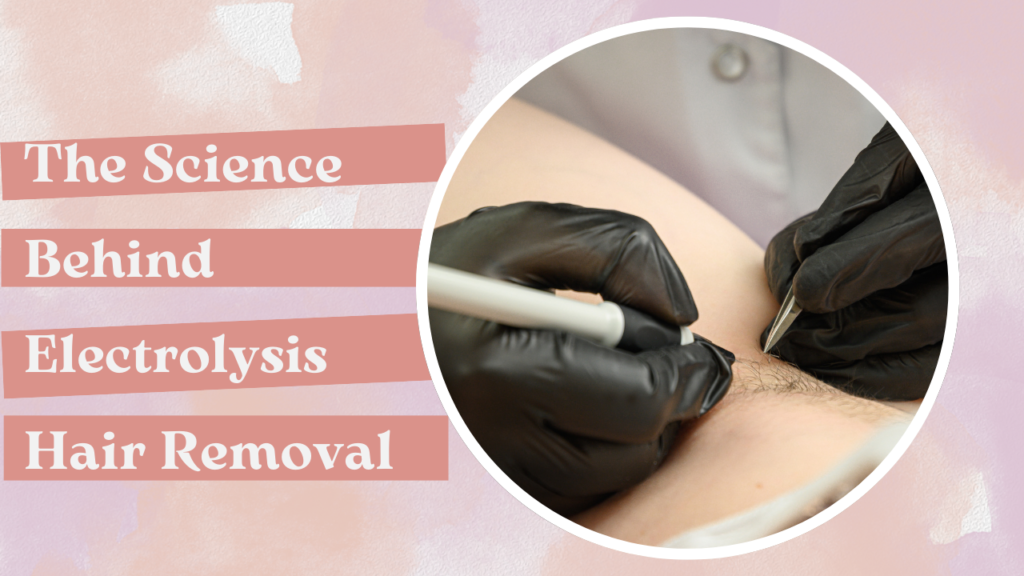Electrolysis hair removal stands as a scientifically proven method for achieving permanent hair removal through precise follicular destruction.
This sophisticated procedure employs electrical currents to eliminate unwanted hair at its root, offering a permanent solution backed by decades of scientific research and clinical success.
The Basics of Hair Growth
Understanding Follicular Structure
Hair growth begins in specialized structures called follicles, which extend from the epidermis into deeper skin layers.
Each follicle contains a hair bulb where active growth occurs, surrounded by various cellular components that regulate the hair growth cycle.
The Growth Cycle
Hair follows a three-phase cycle: anagen (growth), catagen (transition), and telogen (resting).
This cycle influences the effectiveness of electrolysis treatments, as hair must be in the active growth phase for optimal results.
The Principle of Electrolysis
Fundamental Mechanism
Electrolysis works by delivering a precise electrical current directly into the hair follicle through a fine probe.
This process destroys the follicle’s regenerative cells, preventing future hair growth.
Targeting Methodology
The procedure specifically targets the hair follicle’s growth cells while preserving surrounding tissue.
This selective destruction ensures both effectiveness and safety.
See also: why you experience redness after electrolysis hair removal
Scientific Mechanisms of Electrolysis
Galvanic Electrolysis
This method produces sodium hydroxide through chemical decomposition, effectively destroying the follicle through chemical means.
Thermolysis Process
Thermolysis utilizes high-frequency alternating current to generate heat, causing coagulation of follicular tissue.
The Blend Method
Combining galvanic and thermolysis methods, the blend technique maximizes effectiveness while minimizing treatment time.
The Role of Electric Current
Current Application
A precisely controlled electrical current is delivered through a sterile probe inserted into the follicle.
The current’s parameters are adjusted based on hair and skin characteristics.
Cellular Impact
The electrical current disrupts cellular processes within the follicle, permanently preventing future hair growth through controlled damage to regenerative cells.
See also: Why Hair Regrows After Electrolysis
Factors Influencing Electrolysis Effectiveness
Hair Characteristics
The success of treatment varies depending on hair thickness, color, and density.
Coarser hair typically requires more intense treatment parameters.
Skin Considerations
Different skin types respond uniquely to electrolysis.
Treatment protocols must be adjusted accordingly to ensure optimal results while minimizing side effects.
Hormonal Factors
Hormonal fluctuations can influence treatment effectiveness and may require adjusted treatment schedules.
Scientific Evidence for Permanence
Long-term Studies
Clinical research demonstrates that properly performed electrolysis leads to permanent hair removal in treated areas.
Comparative Analysis
When compared to other hair removal methods, electrolysis shows superior long-term results and is the only FDA-approved method for permanent hair removal.
Technological Advancements in Electrolysis
Modern Equipment
Contemporary electrolysis devices incorporate sophisticated monitoring systems and precise current control mechanisms.
Computer Integration
Advanced systems now utilize computer-assisted targeting and treatment planning to optimize results.
See also: How to Achieve Permanent Hair Removal in 6 Months
Safety and Side Effects: A Scientific Perspective
Understanding Reactions
Temporary redness and slight swelling are normal physiological responses to treatment. These effects typically resolve within hours.
Risk Minimization
Proper sterilization protocols and precise technique significantly reduce the risk of adverse effects.
Final Thoughts on Electrolysis Hair Removal Science
The scientific principles behind electrolysis hair removal continue to evolve with technological advancement.
What aspects of this permanent hair removal science interest you most?
FAQ Section
1. Scientific Differences from Laser Hair Removal
Electrolysis targets individual follicles with electrical current, while laser treatments use light energy to affect multiple follicles simultaneously.
2. Treatment Session Requirements
The number of sessions needed depends on factors including hair density, growth cycle timing, and individual response to treatment.
3. Impact on Surrounding Areas
Electrolysis affects only the treated follicles, with no impact on adjacent untreated areas.
4. Skin Conductivity Effects
Skin conductivity variations can influence treatment parameters and effectiveness, requiring adjustments in current intensity and duration.
Archangel Macsika Spa: Your Premier Destination for Electrolysis Hair Removal
At Archangel Macsika Spa in Port Harcourt, Nigeria, we’re at the forefront of electrolysis hair removal science. Our expert technicians use cutting-edge technology to provide you with the most effective permanent hair removal solution.
Here’s why we’re your top choice for electrolysis:
- State-of-the-art equipment: We use the latest blend method technology for optimal results across all skin types.
- Customized treatment plans: Our specialists tailor each session to your unique hair growth patterns and skin sensitivity.
- Comprehensive aftercare: We provide detailed post-treatment guidance to ensure the best long-term outcomes.
Ready to experience the science of permanent hair removal? Book your consultation today at Archangel Macsika Spa and take the first step towards smooth, hair-free skin.

